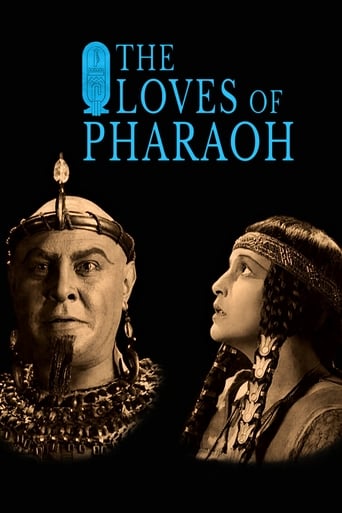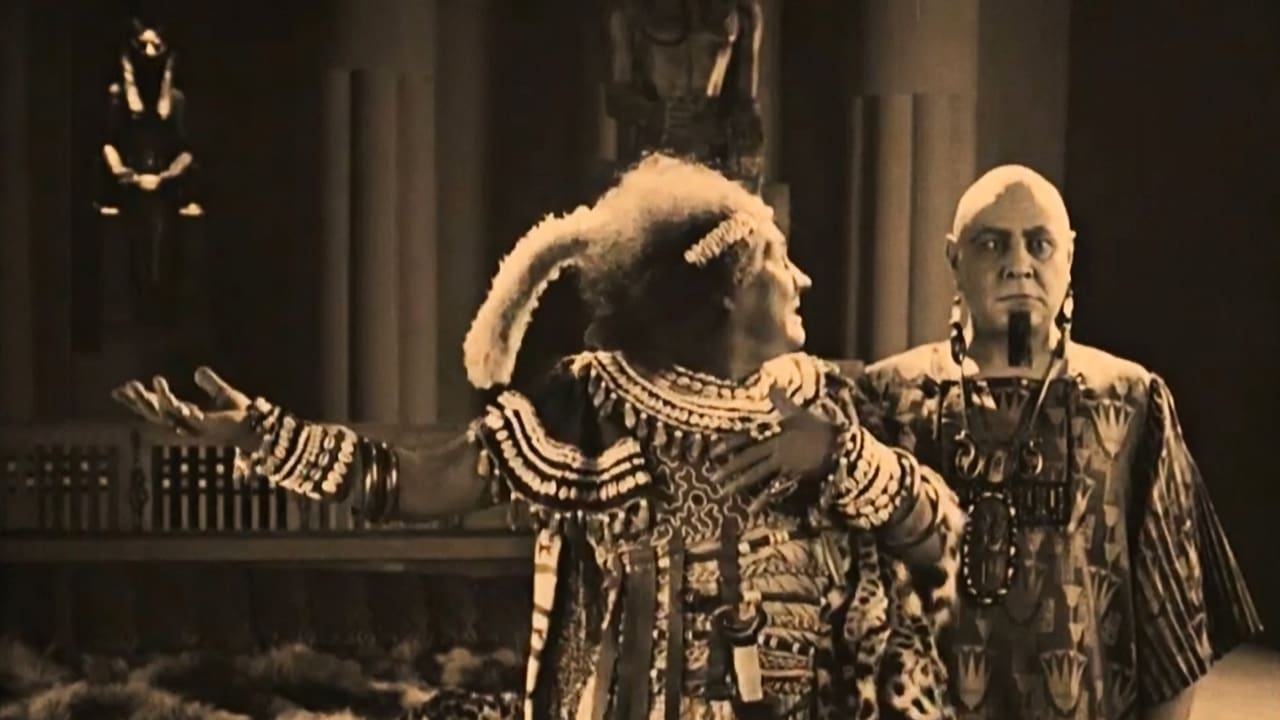Horst in Translation (filmreviews@web.de)
"Das Weib des Pharao" or "The Loves of Pharaoh" is a German movie from 1922, so this one will soon have its 100th anniversary already, only slightly over five years to go. The director is early German filmmaking legend Ernst Lubitsch and he was around the age of 30 when he made this one, long before his Hollywood success. The writers are Norbert Falk and Lubitsch's longtime collaborator Hanns Kräly (later an Oscar winner even, something Lubitsch himself never achieved). But back to this one here. Given the year, it should not be a surprise to anybody that this 100-minute movie is a black-and-white silent film. And as with some other early films from Germany, it takes us into a world and culture that is fairly different compared to ours, especially compared to the fairly bleak years between World War I and the Nazis' rise to power here in Germany.Egypt is the center of the action here and like with many other early silent films, it is a mix of drama, costumes and romance as well. Horror is non-existent in here and neither is comedy. The cast includes a handful of fairly successful silent film actors from back then, not just Emil Jannings, but also Harry Liedtke and Paul Wegener for example and if you have an interest in German movies from that time, then you will see more than just one or two familiar faces. I myself have never been that big really on these very old silent films and sadly this one here cannot change my perception. As many other times, I also felt that it lacks intertitles on many occasions, so that the actual story is fairly difficult to follow at times and the plot not too easy to understand. Still, if you like the genre more than I do and maybe even care about films set in ancient Egypt, then this can be a pretty rewarding watch for your and I would not totally say that I don't recommend it to anybody. However, if this description does not fit you, then maybe it is best to stay away or check out comes other silent films from the 1920s first (more known ones like "Metropolis" or other Fritz Lang works) before deciding to give this one a go. I give it a thumbs-down.
Christopher Craig
TCM presented a beautiful print of Ernst Lubitsch's Egyptian epic THE LOVES OF PHAROAH (1922). Released by Paramount in the US, the film was Lubitsch's last feature in his home country of Germany before setting up camp in Hollywood. (That's another story all together.) The "Lubitsch Touch" in his historically-based epics, such as CARMEN, MADAME DUBARRY, SUMURUN, or ANNA BOLEYN, is the director's ability to present us with the overwhelming sight of the plight of the crowd and then gradually direct our attention to a personal drama taking place within the epic sweep of time and destiny. (He does so more genuinely than DeMille, who seemed to have imitated this approach.) Then, of course,there are the sexual situations, the uncontrollable attractions, and the inevitable rejections that determine the fates of the characters, a theme continued into the director's sophisticated comedies and, later, witty musicals that followed this film. LOVES OF PHAROAH has stunning visual moments both large and small: the crowds working, revolting, being manipulated by rulers to the turning of Emil Jannings to a wall and dropping an outstretched hand, showing his reluctant realization of the futility of his affections. The film is deliberately paced but never draggy. Though there are moments of regret (the depiction of the Ethiopians is particularly stereotyped and inconsistent), this foray into Arabian exotica is a dramatic improvement over the stilted presentations seen in SUMURUN from a couple of years before. With THE LOVES OF PHAROAH, Lubitsch reaches the apex of his epic years (though THE PATRIOT may have reached greater heights, though we'll never know until a print is found).
audiemurph
The fabulous restoration of this film alone makes it worth viewing. The pictures are glossy and luscious as to be almost magical. It makes you realize that even though the movies were still silent in the 1920's, the quality of the film was first rate.Also extremely noteworthy of the version recently shown on TCM is the spectacular orchestral score, really one of the best. Try to actively listen to the music if you can from time to time - especially in the late battle scenes, it is worthy of Wagner.The sets are over the top, and the cast begins as a cast of dozens, then scores, then hundreds, and then literally thousands as the climactic battle scenes are reached. The Germans really outdid themselves here, easily matching the Hollywood spectacles of the same era. With great skill, director Ernst Lubitcsh was able to interweave outlandish spectacle with a lot of close-up tragedy, perhaps having learned this technique from watching D.W. Griffith fliks.Unfortunately, the exaggerated emotive acting is a little painful to watch at times. This is the kind of over-acting histrionics that would be mocked by some for many years after the advent of sound.The plot occasionally borders a bit on the unbelievable as well. I think the silliest thing was when, early in the film, the pharaoh is about to sign a peace treaty with the Ethiopians, when suddenly he is informed that someone is "approaching" the Treasury! In great shock, the king abandons the ceremony to deal with this incredible event personally! This would be like President Roosevelt walking out on the Yalta Conference in order to deal with a dog that had piddled in Lafayette Park across the street from the White House. Silly indeed.The actor playing the hero "Ramphes" may also have the ugliest haircut in the history of serious film.But these are minor distractions. "The Loves of Pharaoh" is art, and it is movie history, and the glorious restoration makes it well worth viewing.
F Gwynplaine MacIntyre
I viewed an incomplete print of 'The Wife of the Pharaoh' that was reconstructed (from several sources) by Stephan Droessler of the Film Museum in Munich. Even in remnant form, this is a phenomenal film: an epic piece of film-making, with 6,000 extras and elaborate sets. 'The Wife of the Pharaoh' is the nearest Ernst Lubitsch came to making a film like 'Metropolis'.'The Wife of the Pharaoh' was released in 1922, the same year that Englishman Howard Carter unsealed Tutankhamen's tomb ... but at this time, much of the most important work in Egyptology was being done by Germans, and German interest in ancient Egypt was high indeed. This film is set in dynastic Egypt (Middle Kingdom, by the look of it) ... and the sets, costumes and props are vastly more convincing than anything done by Hollywood in this same era in films such as 'King of Kings', "Noah's Ark" and the Babylonian sequences of 'Intolerance'.There are of course a few errors in this movie: the elaborate Double Crown symbolising the two kingdoms of Egypt is the proper size and shape, yet the actors heft it about so easily that it's clearly a prop made from some improbably light substance. The pharaoh receives papyrus scrolls bearing messages written in hieroglyphics; this is wrong (the messages would have been written in hieratic, and the king would probably require a scribe to read them on his behalf), yet somebody made a commendable effort to use the proper hieroglyphics ... which is more than Universal Studios bothered to do in any of those 1930s mummy flicks.Emil Jannings gives an operatic performance as the (fictional) king Amenes. The king of the Ethiopians (Paul Wegener), hoping to make peace with Egypt, offers his daughter Theonis to become the wife of Amenes.But Theonis falls in love with Ramphis, the handsome son of the king's adviser Sothis. (Ramphis wears a hairdo stolen from Prince Valiant: one of the few really ludicrous errors in this film.) Amenes sentences the lovers to death, then offers to spare Ramphis from execution (sentencing him to hard labour for life) if Theonis will consent to love only Amenes.There are some truly spectacular scenes in this film, very impressive even in the partial form which I viewed. Paul Wegener gives a fine performance as Samlak, king of the Ethiopians, but he looks like he escaped from a minstrel show: to portray an Ethiopian, Wegener wears blackface and body make-up, and a truly terrible Afro wig. And since his daughter Theonis is presumably also an Ethiopian, why is she white?There are fine performances by Lyda Salmonova as a (white) Ethiopian slave-girl (the nearest equivalent to Aida in this operatic story) and by Albert Bassermann as the adviser who is spitefully blinded at the pharaoh's order. Theodor Sparkuhl's camera work is superlative, as always, and the art direction is brilliant. Although I viewed only an incomplete version of this film, I've read a surviving screenplay; the script (with some lapses in logic) is definitely the most ridiculous part of this film. But the favourable aspects of this movie very definitely outweigh its flaws. I'll rate 'The Wife of the Pharaoh' 9 out of 10.


 AD
AD


